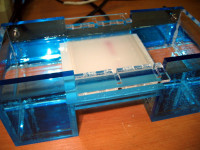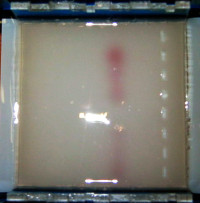Table of Contents
PCR
State of the art PCR and electrophoresis
Since 2025, we have restarted our legendary efforts to have reproducible PCR results. Running workflow includes flowbox, sterile equipment, new centrifuges and thermocyclers… and of course university-grade knowledge.
Bio-Rad iCycler image conventer
The iCycler software is storing images of 96-wells fluorescence activities in their own binary blob .ISI without the possibility to export to any standard format like TIFF or DICOM. So one have to hexdump and write their own conventer…
- isi2tiff.c
// Convert BIO-RAD ISI to TIFF // 16bit grayscale little-endian // CC-BY-NC sachy@brmlab #include <stdio.h> #include <stdlib.h> #include <string.h> #define ISIWIDTH 342 #define TIFFWIDTH 310 #define TIFFHEIGHT 240 #define TIFFHEAD {0x49,0x49,0x2a,0x00,0x88,0x8a,0x04,0x00} unsigned char tt[]={0x11,0x00,0x00,0x01,0x03,0x00,0x01,0x00, 0x00,0x00,0x36,0x01,0x00,0x00,0x01,0x01,0x03,0x00,0x01,0x00,0x00,0x00,0xf0,0x00, 0x00,0x00,0x02,0x01,0x03,0x00,0x02,0x00,0x00,0x00,0x10,0x00,0x10,0x00,0x03,0x01, 0x03,0x00,0x01,0x00,0x00,0x00,0x01,0x00,0x00,0x00,0x06,0x01,0x03,0x00,0x01,0x00, 0x00,0x00,0x01,0x00,0x00,0x00,0x11,0x01,0x04,0x00,0x02,0x00,0x00,0x00,0x72,0x8b, 0x04,0x00,0x12,0x01,0x03,0x00,0x01,0x00,0x00,0x00,0x01,0x00,0x00,0x00,0x15,0x01, 0x03,0x00,0x01,0x00,0x00,0x00,0x02,0x00,0x00,0x00,0x16,0x01,0x03,0x00,0x01,0x00, 0x00,0x00,0x80,0x00,0x00,0x00,0x17,0x01,0x04,0x00,0x02,0x00,0x00,0x00,0x6a,0x8b, 0x04,0x00,0x1a,0x01,0x05,0x00,0x01,0x00,0x00,0x00,0x5a,0x8b,0x04,0x00,0x1b,0x01, 0x05,0x00,0x01,0x00,0x00,0x00,0x62,0x8b,0x04,0x00,0x1c,0x01,0x03,0x00,0x01,0x00, 0x00,0x00,0x01,0x00,0x00,0x00,0x1d,0x01,0x02,0x00,0x02,0x00,0x00,0x00,0x2d,0x00, 0x00,0x00,0x28,0x01,0x03,0x00,0x01,0x00,0x00,0x00,0x02,0x00,0x00,0x00,0x52,0x01, 0x03,0x00,0x01,0x00,0x00,0x00,0x01,0x00,0x00,0x00,0x53,0x01,0x03,0x00,0x02,0x00, 0x00,0x00,0x01,0x00,0x01,0x00,0x00,0x00,0x00,0x00,0x48,0x00,0x00,0x00,0x01,0x00, 0x00,0x00,0x48,0x00,0x00,0x00,0x01,0x00,0x00,0x00,0x00,0x6c,0x02,0x00,0x80,0x1e, 0x02,0x00,0x08,0x00,0x00,0x00,0x08,0x6c,0x02,0x00}; int main(int argc,char **argv) { FILE *in=NULL; FILE *out=NULL; switch(argc) { case 2: { in=fopen(argv[1],"r"); out=stdout; break; } case 3: { in=fopen(argv[1],"r"); out=fopen(argv[2],"w"); break; } default: case 0: case 1: { printf("isi2tif infile [outfile]"); return -1; break; } } unsigned char buff[ISIWIDTH*2]; unsigned char buff2[ISIWIDTH*2*2]; unsigned char th[]=TIFFHEAD; unsigned short h=0; memset(buff,0x00,ISIWIDTH*2); fread(buff,1,38*2,in); fwrite(th,1,sizeof(th),out); while(fread(buff,2,ISIWIDTH,in)==ISIWIDTH && h++<TIFFHEIGHT) { memset(buff2,0xFF,sizeof(buff2)); for(int i=0;i<sizeof(buff)/2;i++) memcpy(buff2+i*4,buff+i*2,2); fwrite(buff2,2*2,TIFFWIDTH,out); } fwrite(tt,1,sizeof(tt),out); fclose(in); fclose(out); return 0; }

Ye olde PCR and electrophoresis
DNA electrophoresis using the OpenPCR http://openpcr.org/
Status
- openPCR working, dry run successful (SW: https://github.com/cathalgarvey/OpenPyCR, running.)
- Taq/dNTP PCR mix obtained from http://www.openbiotech.com
- electrophoresis working, tested at hackathon
- got chemicals:
- ddH2O
- PCR grade agarose (quite little, expensive)
- EtBr
- some DNA fragments for experimentation (pTracer plasmids)
- freezer (-20°C) for DNA/enzyme storage is ready
- we have a wonderful power supply (up to 300V) thanks to Tomsuch
- transilluminator built from blue LEDs
the first test run with crude agar, self made TAE, DIY loading dye (cresol red+sucrose), 60V (with the power source from hwlab), 1.5h:
second test run with agarose and several restriction digest samples using a strong laser and SYBR gold for visualization - blue light filter from infra-soldering station:

some notes for using SYBR gold:
- DO NOT STORE IN GLASS CONTAINER
first test run of the openPCR
Template: pTracer plasmid
Primers: inf pTracer F + R (10uM) designed by chido to amplify the GFP/Bsd gene
PCR mix:
dH2O 33ul mastermix Openbiotech 5x 10 ul primer F 2ul primer R 2ul template 1ng/ul 3ul
total volume 50 ul
Thermocycler settings:
95 °C 60 sec 95 °C 30 sec 60 °C 30 sec 72 °C 60 sec x30 4 °C 20 sec
SYBR gold gel stain:
30 ml TAE, 0.3g agarose gel stained in 10ul SYBR gold diluted in 100ml TAE, 40 min
Results:
We obtained the desired product using Openbiotech master mix that has been stored in -20 °C, but there was no product at all when using a mastermix that has been stored in the fridge. We aliquoted both SYBR gold gel stain and the PCR mastermix so thawing the stock solution is not necessary. OpenPCR works fine! Pictures and analyzed gel coming soon. Next step: devise a protocol for DNA isolation that can be used as a PCR template.
Useful links:
- primer design guide: http://www.premierbiosoft.com/tech_notes/PCR_Primer_Design.html
- paper on horses/rats/cockroaches detection in food via PCR http://journals.tubitak.gov.tr/veterinary/issues/vet-07-31-3/vet-31-3-3-0601-30.pdf
- there are online companies that will synthetize custom primers for a fee http://www.operon.comhttp://www.biogen.cz

